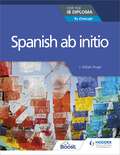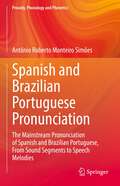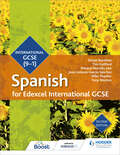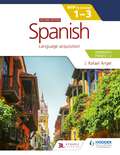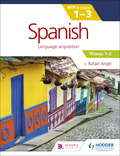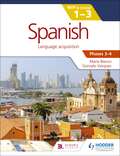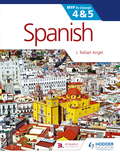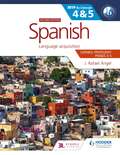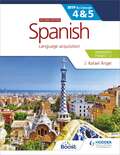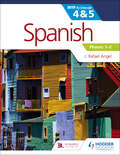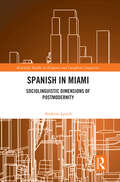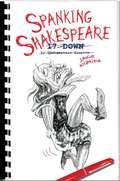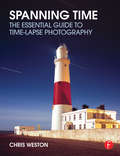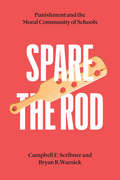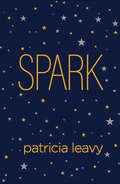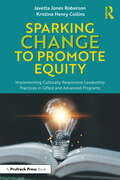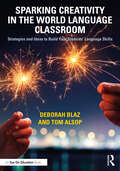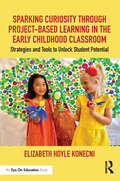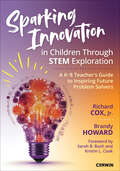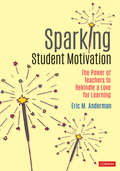- Table View
- List View
Spanish ab initio for the IB Diploma: by Concept
by J. Rafael AngelEnsure that the needs of all IB Students are met with this comprehensive and flexible Student Book, written specifically for the updated Spanish ab initio course. - Communicate confidently by exploring the five prescribed themes through authentic texts and skills practice at the right level, delivered in clear learning pathways. - Produce coherent written texts and deliver proficient presentations with grammar and vocabulary introduced in context and in relation to appropriate spoken and written registers. - Improve receptive skills with authentic written texts, audio recordings spoken at a natural pace, and carefully crafted reading and listening tasks.- Promote global citizenship, intercultural understanding and an appreciation of Hispanic cultures through a wide range of text types and cultural material from around the world. - Deliver effective practice with a range of structured tasks within each unit that build reading, listening, speaking and writing skills.- Establish meaningful links to TOK and CAS, and identify learner profile attributes in action.The audio for the Student Book is FREE to download from www.hoddereducation.com/ibextrasAnswers to the Student Book are included in the accompanying subscription based, Teaching and Learning Resources
Spanish and Brazilian Portuguese Pronunciation: The Mainstream Pronunciation of Spanish and Brazilian Portuguese, From Sound Segments to Speech Melodies (Prosody, Phonology and Phonetics)
by Antônio Roberto SimõesThis book contrasts variations in Spanish and Brazilian Portuguese pronunciation, using as a reference for discussion the mainstream careful speech of news anchors at the national level or the equivalent type of speech: a well-educated style that nonetheless sounds natural. Pursuing an innovative approach, the book uses this view of language as a cornerstone to describe and discuss other social and regional variants relative to that speaking register. It is aimed at speakers of Spanish interested in learning Portuguese and speakers of Portuguese who want to learn Spanish, as well as language specialists interested in bilingualism, heritage languages, in the teaching of typologically similar languages in contrast, and readers with interest in Phonetics and Phonology. The book employs a variety of innovative approaches, especially the reinterpretation of some of the traditional concept in Phonetics, and the use of speech prosodies and speech melodies, a user-friendly strategy to describe speech prosody in languages and speech melody in music through musical notation.
Spanish for Edexcel International GCSE, Second Edition
by Mónica Morcillo Laiz Simon Barefoot Timothy GuilfordThis Student Book provides a grammar-led approach with extensive exam preparation to develop independent, culturally aware students of Spanish, ready for the exam.This book is endorsed by Cambridge International Examinations for the latest IGCSE® (0525) and International Level 1/Level 2 Certificate (0677) syllabuses. Extensive use of Spanish reflects the style of the exams and, with specific advice and practice, it helps students use the acquired skills to their best ability. Topics on Spanish-speaking cultures are integrated throughout to ensure students gain the cultural awareness that is at the heart of this qualification. The book provides up-to-date content following a clear sequencing of topics designed specifically for teaching Spanish at this level. It is designed to develop spontaneous, confident linguists who are able to progress to further study of Spanish.
Spanish for the IB MYP 1-3 (Emergent/Phases 1-2) (Emergent/Phases 1-2) (Emergent/Phases 1-2) (Emergent/Phases 1-2): MYP by Concept Second edition: By Concept
by J. Rafael AngelDevelop your skills to become an inquiring learner; ensure you navigate the MYP framework with confidence using a concept-driven and assessment-focused approach to Spanish, presented in global contexts.- Develop conceptual understanding with key MYP concepts and related concepts at the heart of each chapter. - Learn by asking questions for a statement of inquiry in each chapter. - Prepare for every aspect of assessment using support and tasks designed by experienced educators.- Understand how to extend your learning through research projects and interdisciplinary opportunities.- Think internationally with chapters and concepts set in global contexts.
Spanish for the IB MYP 1-3 (Emergent/Phases 1-2) (Emergent/Phases 1-2) (Emergent/Phases 1-2) (Emergent/Phases 1-2): MYP by Concept Second edition: By Concept
by J. Rafael AngelDevelop your skills to become an inquiring learner; ensure you navigate the MYP framework with confidence using a concept-driven and assessment-focused approach to Spanish, presented in global contexts.- Develop conceptual understanding with key MYP concepts and related concepts at the heart of each chapter. - Learn by asking questions for a statement of inquiry in each chapter. - Prepare for every aspect of assessment using support and tasks designed by experienced educators.- Understand how to extend your learning through research projects and interdisciplinary opportunities.- Think internationally with chapters and concepts set in global contexts.
Spanish for the IB MYP 1-3 Phases 1-2: by Concept
by J. Rafael AngelA concept-driven and assessment-focused approach to Spanish teaching and learning.- Approaches each chapter with statements of inquiry framed by key and related concepts, set in a global context- Supports every aspect of assessment using tasks designed by an experienced MYP educator- Differentiates and extends learning with research projects and interdisciplinary opportunities- Applies global contexts in meaningful ways to offer an MYP Spanish programme with an internationally-minded perspective
Spanish for the IB MYP 1-3 Phases 3-4: by Concept
by Gonzalo Vázquez María BlancoA concept-driven and assessment-focused approach to Spanish teaching and learning.- Approaches each chapter with statements of inquiry framed by key and related concepts, set in a global context- Supports every aspect of assessment using tasks designed by an experienced MYP educator- Differentiates and extends learning with research projects and interdisciplinary opportunities- Applies global contexts in meaningful ways to offer an MYP Spanish programme with an internationally-minded perspective
Spanish for the IB MYP 1-3 Phases 3-4: by Concept
by Gonzalo Vázquez María BlancoA concept-driven and assessment-focused approach to Spanish teaching and learning.- Approaches each chapter with statements of inquiry framed by key and related concepts, set in a global context- Supports every aspect of assessment using tasks designed by an experienced MYP educator- Differentiates and extends learning with research projects and interdisciplinary opportunities- Applies global contexts in meaningful ways to offer an MYP Spanish programme with an internationally-minded perspective
Spanish for the IB MYP 4 & 5
by J. Rafael AngelWe are working with the IB to gain endorsement for the MYP by Concept series.Drive meaningful inquiry for the new framework through a unique concept driven narrative.- Supports every aspect of assessment with opportunities that use the criteria- Gives you easy ways to differentiate and extend learning- Provides a meaningful approach by integrating the inquiry statement in a global context- Develops critical-thinking skills with activities and summative sections rooted in the ATL frameworkAlso coming soon are Teaching and Learning Resources and eTextbooks via Dynamic Learning, our complete digital solution.
Spanish for the IB MYP 4&5 (Capable-Proficient/Phases 3-4, 5-6) (Capable-Proficient/Phases 3-4, 5-6) (Capable-Proficient/Phases 3-4, 5-6) (Capable-Proficient/Phases 3-4, 5-6) (Capable-Proficient/Phases 3-4, 5-6) (Capable-Proficient/Phases 3-4, 5-6) (Capable-Proficient/Phases 3-4, 5-6) (Capable-Proficient/Phases 3-4, 5-6): MYP by Concept Second edition: By Concept
by J. Rafael AngelDevelop your skills to become an inquiring learner; ensure you navigate the MYP framework with confidence using a concept-driven and assessment-focused approach to Spanish, presented in global contexts.- Develop conceptual understanding with key MYP concepts and related concepts at the heart of each chapter. - Learn by asking questions for a statement of inquiry in each chapter. - Prepare for every aspect of assessment using support and tasks designed by experienced educators.- Understand how to extend your learning through research projects and interdisciplinary opportunities.- Think internationally with chapters and concepts set in global contexts.
Spanish for the IB MYP 4&5 (Capable-Proficient/Phases 3-4, 5-6) (Capable-Proficient/Phases 3-4, 5-6) (Capable-Proficient/Phases 3-4, 5-6) (Capable-Proficient/Phases 3-4, 5-6): MYP by Concept Second Edition: By Concept
by J. Rafael AngelDevelop your skills to become an inquiring learner; ensure you navigate the MYP framework with confidence using a concept-driven and assessment-focused approach to Spanish, presented in global contexts.- Develop conceptual understanding with key MYP concepts and related concepts at the heart of each chapter. - Learn by asking questions for a statement of inquiry in each chapter. - Prepare for every aspect of assessment using support and tasks designed by experienced educators.- Understand how to extend your learning through research projects and interdisciplinary opportunities.- Think internationally with chapters and concepts set in global contexts.
Spanish for the IB MYP 4&5 (Emergent/Phases 1-2) (Emergent/Phases 1-2) (Emergent/Phases 1-2) (Emergent/Phases 1-2) (Emergent/Phases 1-2) (Emergent/Phases 1-2) (Emergent/Phases 1-2) (Emergent/Phases 1-2): MYP by Concept Second edition: By Concept
by J. Rafael AngelDevelop your skills to become an inquiring learner; ensure you navigate the MYP framework with confidence using a concept-driven and assessment-focused approach to Spanish, presented in global contexts.- Develop conceptual understanding with key MYP concepts and related concepts at the heart of each chapter. - Learn by asking questions for a statement of inquiry in each chapter. - Prepare for every aspect of assessment using support and tasks designed by experienced educators.- Understand how to extend your learning through research projects and interdisciplinary opportunities.- Think internationally with chapters and concepts set in global contexts.
Spanish for the IB MYP 4&5 (Emergent/Phases 1-2) (Emergent/Phases 1-2) (Emergent/Phases 1-2) (Emergent/Phases 1-2) (Emergent/Phases 1-2) (Emergent/Phases 1-2) (Emergent/Phases 1-2) (Emergent/Phases 1-2): MYP by Concept Second edition: By Concept
by J. Rafael AngelDevelop your skills to become an inquiring learner; ensure you navigate the MYP framework with confidence using a concept-driven and assessment-focused approach to (insert subject), presented in global contexts.- Develop conceptual understanding with key MYP concepts and related concepts at the heart of each chapter. - Learn by asking questions for a statement of inquiry in each chapter. - Prepare for every aspect of assessment using support and tasks designed by experienced educators.- Understand how to extend your learning through research projects and interdisciplinary opportunities.- Think internationally with chapters and concepts set in global contexts.
Spanish for the IB MYP 4&5 Phases 1-2: Phases 1-2
by J. Rafael AngelEndorsed by the IBDrive meaningful inquiry through a unique concept-driven narrative.- Supports every aspect of assessment with opportunities that use the criteria- Gives you easy ways to differentiate and extend learning- Provides a meaningful approach by integrating the inquiry statement in a global context- Develops critical-thinking skills with activities and summative sections rooted in the ATL framework
Spanish in Miami: Sociolinguistic Dimensions of Postmodernity (Routledge Studies in Hispanic and Lusophone Linguistics)
by Andrew LynchSpanish in Miami reveals the multifaceted ways in which the language is ideologically rescaled and sociolinguistically reconfigured in this global city. This book approaches Miami’s sociolinguistic situation from language ideological and critical cultural perspectives, combining extensive survey data with two decades of observations, interviews, and conversations with Spanish speakers from all sectors of the city. Tracing the advent of postmodernity in sociolinguistic terms, separate chapters analyze the changing ideological representation of Spanish in mass media during the late 20th century, its paradoxical (dis)continuity in the city’s social life, the political and economic dimensions of the Miami/Havana divide, the boundaries of language through the perceptual lens of Anglicisms, and the potential of South Florida—as part of the Caribbean—to inform our understanding of the highly complex present and future of Spanish in the United States. Spanish in Miami will be of interest to advanced students and researchers of Spanish, Sociolinguistics, and Latino Studies.
Spanking Shakespeare
by Jake Wizner Richard EwingShakespeare Shapiro has always hated his name. His parents bestowed it on him as some kind of sick joke when he was born, and his life has gone downhill from there, one embarrassing incident after another. Entering his senior year of high school, Shakespeare has never had a girlfriend, his younger brother is cooler than he is, and his best friend's favorite topic of conversation is his bowel movements. But Shakespeare will have the last laugh. He is chronicling every mortifying detail in his memoir, the writing project each senior at Shakespeare's high school must complete. And he is doing it brilliantly. And, just maybe, a prize-winning memoir will bring him respect, admiration, and a girlfriend... or at least a prom date.
Spanning Time: The Essential Guide to Time-lapse Photography
by Chris WestonSpanning Time: The Essential Guide to Time-lapse Photography is the ultimate how-to guide for creating time-lapse films, featuring both still and moving image techniques. Author Chris Weston provides all the information necessary to create compelling time-lapse sequences using a DSLR camera. As well as covering basic equipment requirements and shooting techniques, the book explores what makes a good time-lapse story, visualization, and advanced skills for creating multi-faceted time-lapse sequences. This book provides insider secrets including: How to create an effective time-lapse workflow and ‘see’ in a time-lapse sequence Tips and tricks to successful photographic elements such as shutter speed, aperture, exposure, ISO, dynamic range imaging, and more Step-by-step instructions for using the leading photographic processing hardware and software Best practices for overcoming challenges including time-lapse flicker, light conditions, and color temperatures
Spare the Rod: Punishment and the Moral Community of Schools (History And Philosophy Of Education Ser.)
by Campbell F. Scribner Bryan R. WarnickSpare the Rodtraces the history of discipline in schools and its ever increasing integration with prison and policing, ultimately arguing for an approach to discipline that aligns with the moral community that schools could and should be. In Spare the Rod, historian Campbell F. Scribner and philosopher Bryan R. Warnick investigate the history and philosophy of America’s punishment and discipline practices in schools. To delve into this controversial subject, they first ask questions of meaning. How have concepts of discipline and punishment in schools changed over time? What purposes are they supposed to serve? And what can they tell us about our assumptions about education? They then explore the justifications. Are public school educators ever justified in punishing or disciplining students? Are discipline and punishment necessary for students’ moral education, or do they fundamentally have no place in education at all? If some form of punishment is justified in schools, what ethical guidelines should be followed? The authors argue that as schools have grown increasingly bureaucratic over the last century, formalizing disciplinary systems and shifting from physical punishments to forms of spatial or structural punishment such as in-school suspension, school discipline has not only come to resemble the operation of prisons or policing, but has grown increasingly integrated with those institutions. These changes and structures are responsible for the school-to-prison pipeline. They show that these shifts disregard the unique status of schools as spaces of moral growth and community oversight, and are incompatible with the developmental environment of education. What we need, they argue, is an approach to discipline and punishment that fits with the sort of moral community that schools could and should be.
Spark
by Patricia LeavyProfessor Peyton Wilde has an enviable life teaching sociology at an idyllic liberal arts college--yet she is troubled by a sense of fading inspiration. One day an invitation arrives. Peyton has been selected to attend a luxurious all-expense-paid seminar in Iceland, where participants, billed as some of the greatest thinkers in the world, will be charged with answering one perplexing question. Meeting her diverse teammates--two neuroscientists, a philosopher, a dance teacher, a collage artist, and a farmer--Peyton wonders what she could ever have to contribute. The ensuing journey of discovery will transform the characters' work, their biases, and themselves. This suspenseful novel shows that the answers you seek can be found in the most unlikely places. It can be read for pleasure, is a great choice for book clubs, and can be used as unique and inspiring reading in qualitative research and other courses in education, sociology, social work, psychology, and communication.
Sparking Change to Promote Equity: Implementing Culturally Responsive Leadership Practices in Gifted and Advanced Programs
by Kristina Henry Collins Javetta Jones RobersonSparking Change to Promote Equity illuminates the skills and practices that campus and district-level leaders of gifted and advanced programs need to encourage and support minoritized and marginalized student success in today’s classrooms. Designed to empower leaders and other educational stakeholders to build a more equitably represented student population within gifted and advanced programs, Sparking Change chapters offer a discourse on the benefit of incorporating culturally responsive gifted leadership practices to open the gateway toward recognizing, accepting and nurturing each gifted student according to their true needs, interests, challenges and abilities.By dismantling inequitable and oppressive systems that impede student potential, leaders can leverage CRGL behaviors to foster a more inclusive environment within advanced programs, allowing each student to flourish. In the context of the complexities of today’s schools and advanced programs, this book provides recommendations and strategies towards developing an equitable leadership stance that is needing in gifted and advanced education.Whether you're new to leadership, experienced, or an aspiring leader seeking to advance equity in gifted and advanced education, this book is a valuable resource for educational leaders to become more equitable in advanced level learning.
Sparking Creativity in the World Language Classroom: Strategies and Ideas to Build Your Students’ Language Skills
by Deborah Blaz Tom AlsopJam-packed with inspiring lessons and ideas, this book will help you access and enhance your own creativity in the classroom and inspire your students to become motivated language learners. Top authors Blaz and Alsop share practical strategies to channel your creative impulses and transform them into effective lessons that will energize students of all levels. Aligned with ACTFL (American Council on the Teaching of Foreign Languages) and CEFR (Common European Framework of Reference for Languages) standards, the resources in this book support creativity as a practical process, with step-by-step guidance on goal-setting, implementation, evaluation, and feedback. Examples come from many world languages and cover fun and original topics, including tapping into students’ own interests through cooking, memes, online videos, sports, arts and crafts, and more. Relevant for all levels of language instruction, this text includes plentiful photocopiable charts, templates, and samples to use in the classroom.
Sparking Curiosity through Project-Based Learning in the Early Childhood Classroom: Strategies and Tools to Unlock Student Potential
by Elizabeth Hoyle KonecniLearn how to tap into and illuminate the creative potential in all learners with this inspiring and practical book. This book teaches educators to unlock the creativity in all learners while celebrating inquiry at its highest levels. Each chapter explores how to create learning spaces that invite deep inquiry, initiate thoughtful conversations, invite wonder and curiosity in learning each day, and maintain high levels of engagement. The approachable framework is built around the three-phase project model and is broken down into a user-friendly planning tool, explaining how to approach project-based teaching and learning in any early childhood classroom. Coupled with noteworthy true stories, sample units, and example pictures, early childhood educators will come away with tools and plans to enhance teaching and learning practices in their classroom through a project-based approach.
Sparking Innovation in Children Through STEM Exploration: A K-8 Teacher′s Guide to Inspiring Future Problem Solvers
by Richard Cox Brandy HowardInnovation isn′t just a goal; it′s a necessity in today′s world. Today, educators face an imperative: prepare learners for an unpredictable future. Sparking Innovation in Children Through STEM Exploration: A K-8 Teacher′s Guide to Inspiring Future Problem Solvers is here to help meet that challenge by offering the tools to transform classrooms into ecosystems of creativity, collaboration, and critical thinking. This groundbreaking book goes beyond traditional STEM education and offers a comprehensive framework that helps educators cultivate the next generation of innovative thinkers and problem-solvers. Authors Richard Cox, Jr. and Brandy Howard introduce the Innov8 Framework, a dynamic and flexible roadmap designed to foster curiosity, spark imagination, and build critical thinking within classrooms and beyond. Rooted in justice, empathy, and inquiry-based learning, this approach ensures every learner is empowered to contribute their unique perspective to real-world challenges. With hands-on strategies to ensure access for everyone, this book Offers practical, step-by-step guidance through The Innov8 Framework, which introduces the eight phases of innovation—from sparking curiosity to sustaining impact Provides adaptable tools and resources such as editable lesson plans, interest surveys, reflection prompts for both educators and learners, and learner feedback tools designed to seamlessly integrate with existing standards Includes engaging real-world case studies of thriving innovation ecosystems and personal profiles of educators driving innovation, showcasing actionable steps to replicate their success Sparking Innovation in Children Through STEM Exploration provides educators with the tools to ignite curiosity, foster collaboration, and empower young learners to become confident, creative problem-solvers. Prepare your classrooms to shape the future. Your learners will thrive, and so will you.
Sparking Innovation in Children Through STEM Exploration: A K-8 Teacher′s Guide to Inspiring Future Problem Solvers
by Richard Cox Brandy HowardInnovation isn′t just a goal; it′s a necessity in today′s world. Today, educators face an imperative: prepare learners for an unpredictable future. Sparking Innovation in Children Through STEM Exploration: A K-8 Teacher′s Guide to Inspiring Future Problem Solvers is here to help meet that challenge by offering the tools to transform classrooms into ecosystems of creativity, collaboration, and critical thinking. This groundbreaking book goes beyond traditional STEM education and offers a comprehensive framework that helps educators cultivate the next generation of innovative thinkers and problem-solvers. Authors Richard Cox, Jr. and Brandy Howard introduce the Innov8 Framework, a dynamic and flexible roadmap designed to foster curiosity, spark imagination, and build critical thinking within classrooms and beyond. Rooted in justice, empathy, and inquiry-based learning, this approach ensures every learner is empowered to contribute their unique perspective to real-world challenges. With hands-on strategies to ensure access for everyone, this book Offers practical, step-by-step guidance through The Innov8 Framework, which introduces the eight phases of innovation—from sparking curiosity to sustaining impact Provides adaptable tools and resources such as editable lesson plans, interest surveys, reflection prompts for both educators and learners, and learner feedback tools designed to seamlessly integrate with existing standards Includes engaging real-world case studies of thriving innovation ecosystems and personal profiles of educators driving innovation, showcasing actionable steps to replicate their success Sparking Innovation in Children Through STEM Exploration provides educators with the tools to ignite curiosity, foster collaboration, and empower young learners to become confident, creative problem-solvers. Prepare your classrooms to shape the future. Your learners will thrive, and so will you.
Sparking Student Motivation: The Power of Teachers to Rekindle a Love for Learning (Corwin Teaching Essentials)
by Eric M. AndermanBe the change that lights the learning fire. Discover how you, as a classroom teacher, can generate enthusiasm, confidence, and joy in your students that will affect their learning and lives. Delve into the what, and why of motivation and how it affects learning. Then, learn how to spark motivation using practical, research-informed strategies that address how to ? Hone student grouping, rewards, technology, and competition for positive impact ? Confront and disarm testing conflicts to make assessments a pleasant student experience ? Examine and empower teacher–student relationships ? Rethink rules and procedures to improve behavioral outcomes
